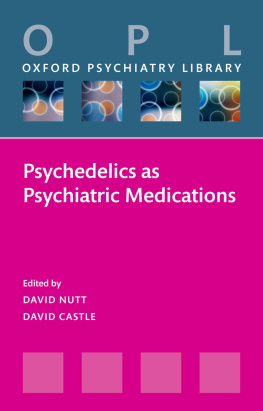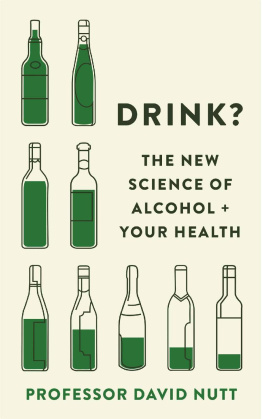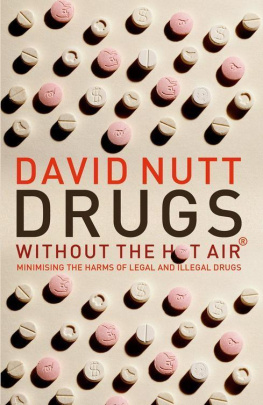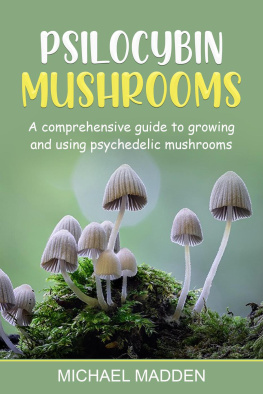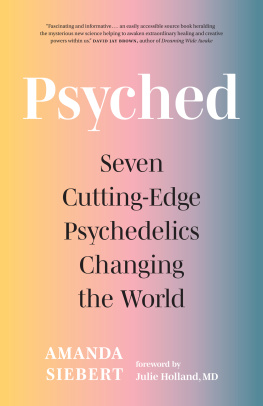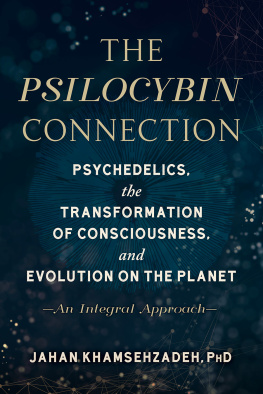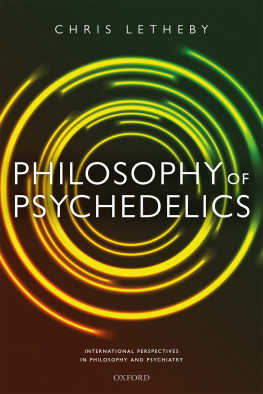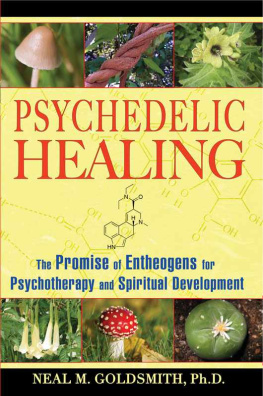
Psychedelics as Psychiatric Medications

Great Clarendon Street, Oxford, OX2 6DP,
United Kingdom
Oxford University Press is a department of the University of Oxford.
It furthers the Universitys objective of excellence in research, scholarship, and education by publishing worldwide. Oxford is a registered trade mark of Oxford University Press in the UK and in certain other countries
Oxford University Press 2023
The moral rights of the authors have been asserted
First Edition published in 2023
All rights reserved. No part of this publication may be reproduced, stored in a retrieval system, or transmitted, in any form or by any means, without the prior permission in writing of Oxford University Press, or as expressly permitted by law, by licence or under terms agreed with the appropriate reprographics rights organization. Enquiries concerning reproduction outside the scope of the above should be sent to the Rights Department, Oxford University Press, at the address above
You must not circulate this work in any other form and you must impose this same condition on any acquirer
Published in the United States of America by Oxford University Press
198 Madison Avenue, New York, NY 10016, United States of America
British Library Cataloguing in Publication Data
Data available
Library of Congress Control Number: 2022952041
ISBN 9780192863607
eISBN 9780192678522
DOI: 10.1093/med/9780192863607.001.0001
Oxford University Press makes no representation, express or implied, that the drug dosages in this book are correct. Readers must therefore always check the product information and clinical procedures with the most up-to-date published product information and data sheets provided by the manufacturers and the most recent codes of conduct and safety regulations. The authors and the publishers do not accept responsibility or legal liability for any errors in the text or for the misuse or misapplication of material in this work. Except where otherwise stated, drug dosages and recommendations are for the non-pregnant adult who is not breast-feeding
Links to third party websites are provided by Oxford in good faith and for information only. Oxford disclaims any responsibility for the materials contained in any third party website referenced in this work.
Preface
We are very pleased to present this book, which provides a current appraisal of a very fast-moving field. We are gratified by having chapters by thought leaders from across the world, who have given a good sense of where we came from, where we are, and where we are going, in terms of psychedelics as treatments for psychiatric maladies and addictions. It should be noted that this book has embraced a very broad definition of psychedelics and related agents, including ketamine (a dissociative anaesthetic) and N-methyl-3,4-methylenedioxyamphetamine (MDMA, an entactogen), along with the classic psychedelics (e.g. psilocybin, D-lysergic acid diethylamide (LSD), dimethyltryptamine (DMT), ibogaine, and mescaline), as well as some lesser-known agents (muscimol, salvinorin A, mescaline, 2C-B, and 5-methoxy-DMT). This has been in part a response to the fact that these agents are all novel in terms of mechanisms of action; that all entail a rethinking of traditional therapeutic wrap around, in terms of the psychotherapeutic component (which, for ease, we refer to as psychedelic-assisted psychotherapy or PAP), and that all are in a stage of excited discovery. Indeed, the excitement associated with the revisiting of these agents as potential treatments for mental health and addictions is evidenced by a massive surge in publications, lectures, and media coverage.
We believe this book will be helpful to specialists and nonspecialists alike. The science and art of psychedelic psychiatry are presented, along with due cautions and concerns for how the future of this fascinating group of compounds can, along with psychotherapeutic support, help patients with a range of mental health and addiction problems.
David Nutt and David Castle
February 2022
Contents
Chase Thompson and Ishrat M. Husain
Laurie Higbed and Ben Sessa
James J. Rucker and David Erritzoe
Michael C. Mithoefer and David E. Presti
Mihai Avram, Felix Mller, and Stefan Borgwardt
Daniel Perkins, Simon G. D. Ruffell, and Jerome Sarris
Deborah C. Mash
James Linden and Daniel Robin
Joshua D. Di Vincenzo, Joshua D. Rosenblat, and Roger S. McIntyre
Joanna C. Neill, Mohammed Shahid, Rosalind Gittins, Anne K. Schlag, and Frank I. Tarazi
David Castle, Nicole Ledwos, and David Nutt
| 5-HT | Serotonin |
| ACE | Adverse childhood experience |
| ACLS | Advanced Cardiac Life Support |
| AR | Augmented reality |
| ASI | Addiction Severity Index |
| BD | Bipolar disorder |
| BDNF | Brain-derived neurotrophic factor |
| BOLD | Blood oxygen level-dependent |
| CADSS | Clinician-Administered Dissociative States Scale |
| CAPS | Clinician-Administered PTSD Scale |
| CBCT | Cognitive-behavioural conjoint therapy |
| CDLIN | Controlled Drug Local Intelligence Networks |
| CEQ | Challenging Experiences Questionnaire |
| CNS | Central nervous system |
| CRP | C-reactive protein |
| CSA | Controlled Substances Act |
| DAAC | Drug Abuse Advisory Committee |
| DMN | Default-mode network |
| DMT | N, N-dimethyltrpyamine |
| DOS | Delirium observation scale |
| DSM-5 | Diagnostic and Statistical Manual of Mental Disorders, fifth ed. |
| EBI | Emotional Breakthrough Inventory |
| EC | Endothelial cell |
| ECG | Electrocardiogram |
| EEG | Electroencephalogram |
| EMA | European Medicines Agency |
| FDA | Food and Drug Administration |
| FM | Frequency Modulation |
| GABA | -Aminobutyric acid |
| GERD | Gastroesophageal reflux |
| GLP | Good Laboratory Practice |
| GPCR | G-protein coupled receptor |
| HNK | Human Natural Killer |
| IASC | Inventory of Altered Self-Capacities |
| IBN | Intrinsic brain networks |
| ICD-10 | International Classification of Diseases, tenth ed. |
| IPT | interpersonal psychotherapy |
| LSD | D-lysergic acid diethylamide |
| MAOI | Monoamine oxidase-A enzyme inhibitor |
| MAPS | Multidisciplinary Association for Psychedelic Studies |
| MDA | 3,4-Methylenedioxyamphetamine |
| MDD | Major depressive disorder |
| MDMA | 3,4-Methyl-enedioxy-methamphetamine |
| MEG | Magnetoencephalography |
| MEQ | Mystical Experiences Questionnaire |
| MHRA | Medicines and Healthcare products Regulatory Agency |
| MI | Motivational interviewing |

